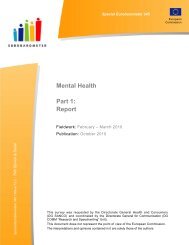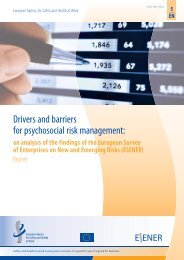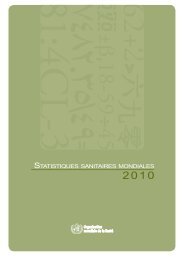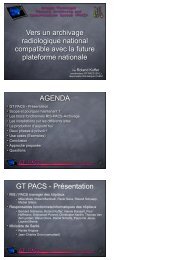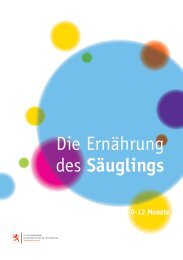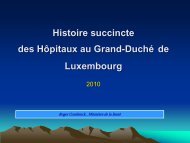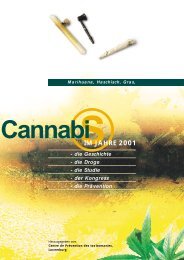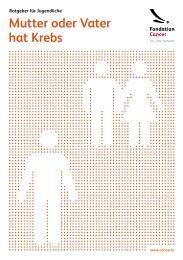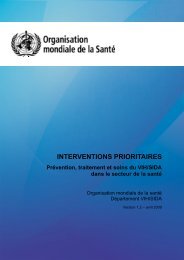healthy and active ageing - EuroHealthNet's Healthy Ageing Website
healthy and active ageing - EuroHealthNet's Healthy Ageing Website
healthy and active ageing - EuroHealthNet's Healthy Ageing Website
Create successful ePaper yourself
Turn your PDF publications into a flip-book with our unique Google optimized e-Paper software.
C. Life-long learning <strong>and</strong> e-inclusion<br />
An additional important way to stimulate social inclusion <strong>and</strong> <strong>healthy</strong> <strong>ageing</strong> is through the promotion of<br />
life-long learning. According to the EU mental health conference (See box 9), lifelong learning initiatives<br />
are effective means to increase activity, responsibility <strong>and</strong> to reduce dependency. It is the responsibility of<br />
communities, through local <strong>and</strong> national policies, to create institutional framework conditions <strong>and</strong> learning<br />
environments in which older individuals feel welcome <strong>and</strong> motivated to develop their own knowledge <strong>and</strong><br />
skills in order to continue to be able to keep <strong>active</strong>.<br />
Amongst the approaches considered effective for learning in later life are those that take into account the<br />
knowledge of older people, those that entail learning in groups or networks <strong>and</strong> learning through electronic<br />
platforms. In addition, projects <strong>and</strong> programmes show the best results when older people are involved in<br />
the project design <strong>and</strong> implementation, through peer to peer learning, when older people contribute to the<br />
project as networkers <strong>and</strong> trainers <strong>and</strong> when the action responds to older people’s feedback. Organisations<br />
focusing on learning activities should also provide initiatives to increase participation of excluded older<br />
people, particularly from disadvantaged backgrounds. Moreover, opportunities to take part in social groups<br />
<strong>and</strong> community led networks should be pursued as they have been deemed effective at reaching hard to<br />
reach groups, but there should also be an increasing focus on utilising e-inclusion methods, through ICT<br />
technologies <strong>and</strong> online tools, to reach vulnerable groups. 35<br />
There is a huge array of life-long learning programmes for older people all over Europe for every type of<br />
interest: from the university of the third age to local education in community centres. Courses cover many<br />
subjects <strong>and</strong> may be taken for pleasure or practical interest. Such courses are accessible in many different<br />
ways, from the more traditional local community centres to online programmes.<br />
Many older people, particularly those in deprived <strong>and</strong>/or minority groups, do not have basic internet skills.<br />
Developing such skills is an important form of lifelong learning that can also stimulate their social inclusion<br />
<strong>and</strong> integration. The 2006 Riga Declaration on e-Inclusion identified the promotion of cultural diversity in<br />
Europe as one of its six priorities by improving the possibilities for economic <strong>and</strong> social participation <strong>and</strong><br />
integration, creativity <strong>and</strong> entrepreneurship of immigrants <strong>and</strong> minorities by stimulating their participation in<br />
the information society. 36 Basic internet skills can, for example, be useful to reach <strong>and</strong> support women from<br />
ethnic minorities, who at present have a much lower uptake of internet use compared to males.<br />
Box 17<br />
Key resource<br />
Overview of Digital Support Initiatives for/by Immigrants <strong>and</strong> Ethnic<br />
Minorities (IEM) in the EU27<br />
This report from 2008 provides an overview of the range of resources for migrants <strong>and</strong> people from ethnic<br />
minorities, deriving from EC supported projects <strong>and</strong> ethnic community websites.<br />
The report observes that many immigrant <strong>and</strong> ethnic minorities seem to have similar ICT adoption rates to<br />
the EU population, despite lower socio-economic status. Nevertheless, lack of digital literacy <strong>and</strong> access<br />
to ICT are still critical for many immigrants <strong>and</strong> ethnic minorities <strong>and</strong> 30% of the 119 initiatives presented in<br />
this overview address these barriers. Most such initiatives are led by migrants <strong>and</strong> associations of migrants<br />
themselves, as a ‘voice’ or a dialogue with their host society. Adaptation/development of public e-services<br />
occurs on a limited scale. Most initiatives are highly fragmented <strong>and</strong> face sustainability problems, but some<br />
are well established.<br />
See: Overview of Digital Support Initiatives for/by Immigrants <strong>and</strong> Ethnic Minorities (IEM) in the EU27 S.<br />
Kluzer, A. Hache, <strong>and</strong> C. Codagnone: ftp://ftp.jrc.es/pub/EURdoc/JRC48588.pdf<br />
35 EU Thematic conference on mental health of older people, Madrid.<br />
36 ICT for an Inclusive Society Conference, Riga 2006: http://ec.europa.eu/information_society/events/ict_riga_2006/doc/declaration_riga.pdf<br />
31



